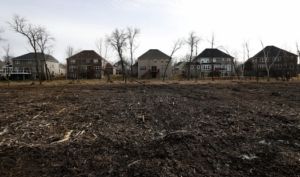Residents Furious as City Levels Hundreds of Trees to Sell Wetland Credits
Sometimes you can’t see the forest for the trees. But in one suburban Blaine neighborhood, you can’t see the forest because the city leveled the trees without warning as part of a 500 acre wetland restoration project. A Star Tribune photo shows what’s left–bare ground.
More than 1,000 trees by some estimates were mowed down in January to the utter shock of residents, whose homes back up to what used to be a treeline along the swamp–all in the name of the environment.
Richard Holmes said he and his wife have lived along the ocean in Florida and next to a lake in Virginia. When they moved to Blaine, they chose a home on the west side of the Blaine Wetland Sanctuary because they loved the beauty of the area with the trees and wildlife.
So he was shocked when in early January a contractor came in and starting cutting down trees. He said at the end of their street – Naples Circle – “there has literally been enough cutting done for an expressway.”
Kevin Groves has seen fox, deer, woodpeckers, owls and pheasants in the past and is concerned what the long-term effects will be.
“The deer don’t know what to do now. They’re running around trying to figure it out,” he told the Blaine City Council at a Jan. 19 meeting.
The ages of trees that were cut down in January ranged from 40 to 60 years old and many were starting to rot and die, he said.
“They’re not like oaks and some of those trees that will live for a long, long time,” Hafner said. “These are shorter life trees, aspen and ash and those type of things. Some of those were getting close to the longevity of their life anyway.”
But there’s a financial as well as environmental motive beneath the surface. The northern Twin Cities suburb plans to cash in on the restoration project by selling off so-called wetland credits to developers for millions of dollars. While homeowners say their property values will take a big hit, the city stands to rake in an estimated $7 million by exploiting environmental credits tied to the project. Blaine already received $4 million from developers purchasing wetland credits in a previous restoration.
Restoring these wetlands gives the city wetland credits that it can sell to developers working on projects elsewhere where there is a wetland impact. Blaine is using the money to fund ongoing maintenance of the Blaine Wetland Sanctuary and future projects including trails, nature center and information boards, for example.
Although the project was in the works for years, the city held no public meeting before revving up the chainsaws. By then, it was too late to save not only hundreds of trees but some residents’ confidence in government.
Mohammmad Odeh, originally from Jordan, said he learned to not trust public servants in that country and expected more when he moved to the United States 20 years ago.
Odeh was working from home on a day when trees were being cut down. Trees that took decades to grow were each cut down in less than a minute. “It just killed me,” he said.
